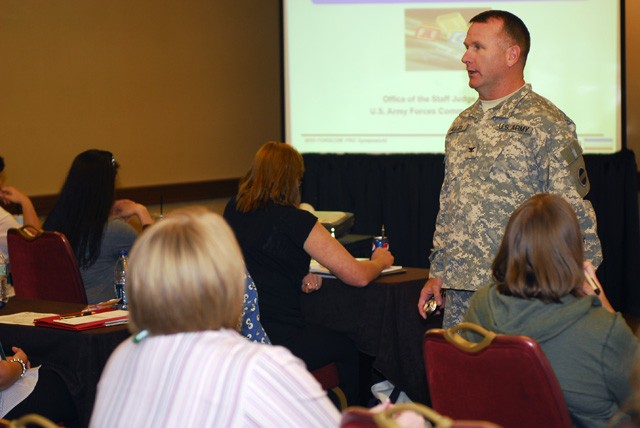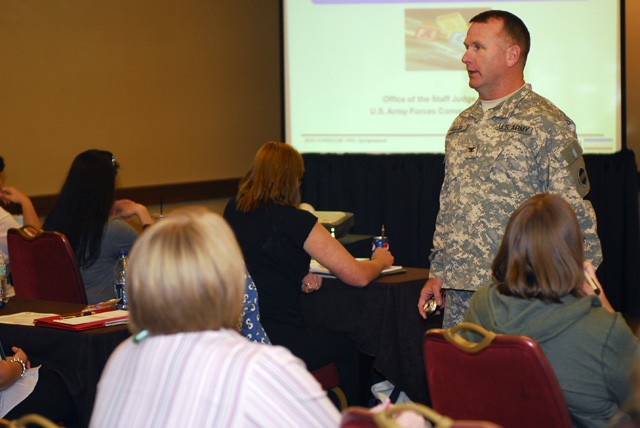CRYSTAL CITY, Va. (Oct. 23, 2010) - Knowing when you can and when you can't spend money to support your unit's Family Readiness Group can sometimes be confusing, especially for volunteer FRG leaders.
That's why Col. Norman F. Allen, staff judge advocate for U.S. Army Forces Command, led a breakout session today at the third annual FORSCOM FRG Training Symposium held at the Hyatt Crystal City Hotel that included information about funding and fundraising.
Allen hit on key points FRG leaders need to consider when they are spending money to take care of their unit's Soldiers and Families, or when they are considering how to raise funds for their FRG's future activities.
"When you go back to work something with your Family Readiness Group and somebody has a great idea or is changing the publication, you have to stop and think about what rules the Army has," said Allen.
FRG missions must be funded by the unit's Appropriated Funds (APF) provided by the commander, and the mission must be Soldier-orientated, said Allen. FRG activities may not be augmented with personal money, and augmentation can't be allowed even when APF are not available, said Allen.
When it comes to fundraising and donations, they are limited to $10,000 annually and regulations prohibit FRG leaders from using APF for food, social activities or entertainment.
"The mission of Family Readiness Groups is not to raise money," said Allen. "They (FRGs) are to spend money and take care of Family and Soldiers."
According to Army Regulation 608-1, the FRG mission is to act as an extension of the unit by providing official, accurate command information; provide mutual support between the command and FRG membership; advocate more efficient use of available community resources; and help Army Families solve problems at the lowest level.
The FRG budget process consists of three steps. First, the commander must consider FRG mission activity requirements when planning the unit's annual budget. Second, the commander must approve a budget Standing Operating Procedure (SOP) that describes the support available for FRG mission activities, and third, FRG leaders must be familiar with the FRG budget SOP and follow its procedures for requesting support.
To facilitate their unit's FRG, commanders allow them to use government office space, equipment, paper, installation post offices for official mail and government vehicles.
It's important to remember that "the mission of the FRG is not fundraising and that is what drives the constraints," Allen said. "Here's what it really comes down to: ask yourselves are you doing the right thing' And, if the answer is yes, then you will be able to follow the rules and stay within the (legal) limit, allowing your FRG to run smoothly," he said.
If you are unsure about a funding or fundraising issue, don't forget to make use of the resources available to you at your local installation. Allen said, your unit legal office or your installation Staff Judge Advocate office can provide useful guidance.
10 FRG "Rules to Live By"
1. FRG "mission activities" must be funded with Appropriated Funds.
2. Word with your command to ensure FRG mission needs are included in the unit's budget - when APF are gone, they're gone, and you can't augment them with other funds.
3. No food, entertainment, or social activities with APF-use informal funds (but not for the unit ball!).
4. FRGs can only fundraise among DOD personnel who benefit from the FRG's activities.
5. Fundraise only for specific, planned purposes - the mission of FRGs is not fundraising.
6. There's a $10,000 annual limit on fundraising/donations.
7. NO SOLICITATION of gifts/donations; Can let potential donors know of the FRG's needs in response to an inquiry.
8. There's a $1,000 limit on donations to individual FRGs/ gifts > $1,000 go to the installation and cannot be earmarked for specific FRGs.
9. No endorsement of private organizations or commercial sponsorship.
10. Consult your local SJA when fundraising, accepting gifts, or whenever you have a question about how you can spend money!


Social Sharing